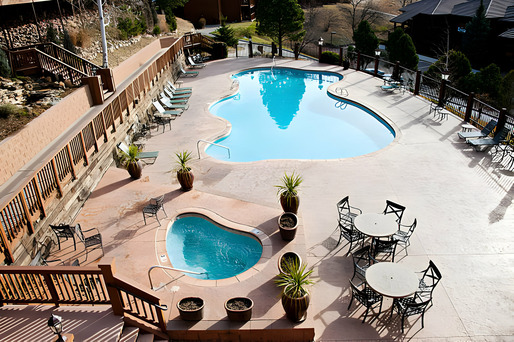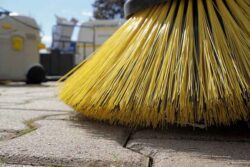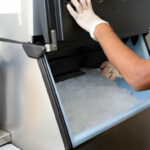
Welcome to the refreshing world of “Commercial Pool Area Cleaning: Safety and Aesthetics,” where keeping the pool sparkling clean is not just about looks but also about making sure everyone has a splashing good time. In this guide, we’re going to dive into the simple yet crucial steps that keep the pool area safe and inviting for all swimmers, whether you’re running a hotel pool or managing a community center. So, grab your swim trunks, and let’s wade into the pool-cleaning secrets that make every dip a clean and joyful experience.
Imagine a pool where the water is glistening clear, the deck is immaculate, and sunlight dances across the surface. That is the ideal we are examining here—a pool area that is visually stunning but also a safe haven. Over the course of the next paragraphs, we will reveal why cleaning your pool is like wearing a superhero cape—it ensures that everyone can enjoy the water without fear of falls, trips, or murky swims. Let us explore the ease and significance of commercial pool area cleaning together!
Click here to have a glance at our post on Commercial Recording Studio Cleaning: Achieving Audio Excellence which you will not want to miss.
Importance of Pool Area Cleaning
1. Ensuring Swimmer Safety
The top priority of pool area cleaning is ensuring the safety of swimmers. A clean pool area minimizes slip and trip hazards, creating a secure environment for both adults and children. Regular cleaning prevents accidents, making every splash worry-free.
2. Preventing Water Contamination
Clean pool surroundings contribute to water purity. Debris, leaves, and dirt around the pool can find their way into the water, leading to contamination. Proper cleaning prevents pollutants from entering the pool, maintaining water quality and hygiene.
3. Enhancing Aesthetic Appeal
A clean pool area is an inviting one. Sparkling waters, well-maintained decks, and tidy lounging areas create an aesthetic appeal that attracts visitors. A visually pleasing pool area not only delights guests but also reflects positively on the establishment.
4. Extending Pool Lifespan
Regular cleaning extends the lifespan of pool equipment and structures. Pool pumps, filters, and deck materials are prone to wear from dirt and debris. Cleaning these components ensures they function optimally, reducing maintenance costs and prolonging their usage.
5. Compliance with Health Standards
Adhering to health and safety standards is vital for commercial pool operators. Regular cleaning and maintenance demonstrate a commitment to providing a hygienic environment, aligning with regulations and ensuring a safe space for all pool users.
See also our post on How to Clean and Disinfect High-Touch Surfaces in Public Spaces which will ease you cleaning task.
Daily Cleaning Protocols
Skimming and Debris Removal
Commence each day with skimming the pool surface to remove debris. Use a pool net to collect leaves, insects, and any floating items. Debris removal is crucial for preventing contamination and maintaining a clean water surface.
Pool Deck Sweeping
Sweep pool decks daily to remove dirt, sand, and other loose particles. A clean deck prevents dirt from being tracked into the pool, maintaining water clarity and reducing the need for excessive chemical treatments.
Trash Receptacle Emptying
Empty trash receptacles daily to prevent overflow and litter accumulation. A tidy pool area includes clean and available trash bins, encouraging visitors to dispose of waste properly and contribute to a clean environment.
Restroom and Changing Area Cleaning
If the pool area includes restrooms and changing facilities, daily cleaning is essential. Disinfect surfaces, restock supplies, and ensure cleanliness in these areas. Clean and well-maintained facilities contribute to a positive overall experience for pool users.
Inspecting Pool Equipment
Daily inspections of pool equipment are critical for identifying issues promptly. Check pool pumps, filters, and circulation systems for any signs of malfunction. Addressing equipment problems early prevents disruptions to pool operations.
Here is our post on How to Clean and Sanitize Commercial Dog Grooming Areas
Weekly and Monthly Maintenance Tasks
Pool Vacuuming
Schedule weekly pool vacuuming to remove debris settled at the pool bottom. Vacuuming enhances water clarity and prevents the buildup of organic matter that could compromise water quality.
Tile and Grout Cleaning
Clean pool tiles and grout on a weekly basis. Use a mild cleaner to remove mineral deposits and prevent the growth of mold or algae. Clean tiles contribute to the overall cleanliness and aesthetic appeal of the pool area.
Lawn and Landscape Maintenance
For pool areas with adjacent lawns or landscaping, conduct weekly maintenance. Trim plants, remove weeds, and ensure proper drainage to prevent debris from entering the pool. Well-kept landscaping adds to the beauty of the pool environment.
Deck Pressure Washing
Monthly deck pressure washing removes embedded dirt and stains. Use a pressure washer to clean pool decks thoroughly. Clean decks not only enhance aesthetics but also contribute to a safer surface by reducing slipperiness.
Pool Water Testing
Regularly test pool water chemistry on a weekly basis. Check pH levels, chlorine concentration, and alkalinity. Proper water balance prevents the growth of harmful bacteria and ensures a safe and enjoyable swimming experience.
Specialized Cleaning Protocols
Biohazard Response
Establish specialized protocols for handling biohazard incidents, such as vomit or fecal accidents. Train staff on proper cleanup procedures and provide necessary protective equipment. Prompt and thorough biohazard response is critical for preventing water contamination.
Pool Cover Cleaning
If the pool has a cover, incorporate regular cleaning into maintenance routines. Clean covers prevent the accumulation of dirt and debris, ensuring that the cover remains effective in keeping the pool clean during non-use periods.
Water Feature Maintenance
For pools with water features such as fountains or waterfalls, implement specialized cleaning protocols. Regularly clean and inspect these features to prevent clogs and maintain their functionality and aesthetic appeal.
Grill and Food Area Cleaning
If the pool area includes grills or food service areas, establish specialized cleaning procedures. Regularly clean grills, surfaces, and utensils to prevent contamination and ensure food safety for poolside dining.
Diving Board and Slide Cleaning
For pools with diving boards or slides, include specialized cleaning for these structures. Clean and inspect diving boards and slides to ensure their structural integrity and prevent accidents due to slippery surfaces.
Here expert tips on the Practical Tips on How to Dry Out Water-Damaged Insulation in Commercial Properties which will make you cleaning task hassle free.
Communication and User Education
Signage for Safety Guidelines
Place clear and visible signage around the pool area outlining safety guidelines and cleanliness expectations. Communicate rules such as showering before entering the pool and disposing of trash properly.
Poolside Attendant Interaction
If feasible, station poolside attendants to interact with visitors. Attendants can provide information on cleanliness expectations, answer questions, and address any concerns promptly. A friendly presence encourages compliance with pool area rules.
User Education Programs
Implement user education programs to inform visitors about the importance of cleanliness. Distribute informational materials or conduct brief orientations on pool cleanliness practices. Engaged users are more likely to contribute to maintaining a clean pool environment.
Lost and Found Procedures
Establish clear procedures for lost and found items. Encourage visitors to report and claim lost items promptly. Regularly clear the lost and found area to prevent the accumulation of unclaimed items that may contribute to clutter.
Feedback Mechanism
Create a feedback mechanism for pool users to report cleanliness concerns or provide suggestions. Actively seek input from visitors to identify areas for improvement and demonstrate responsiveness to user feedback.
Conclusion
Let this guide serve as your compass as you navigate the waters of “Commercial Pool Area Cleaning: Safety and Aesthetics,” where every splash is a testament to the commitment to cleanliness and the enjoyment of a pristine poolside experience. Dive in and make a splash, knowing that a clean and safe pool awaits! When it comes to commercial pool areas, cleanliness is the lifeguard that ensures both safety and aesthetics. By embracing systematic cleaning protocols and fostering a culture of cleanliness, commercial pool operators can create an aquatic haven that beckons visitors with its crystal-clear waters and inviting surroundings.







